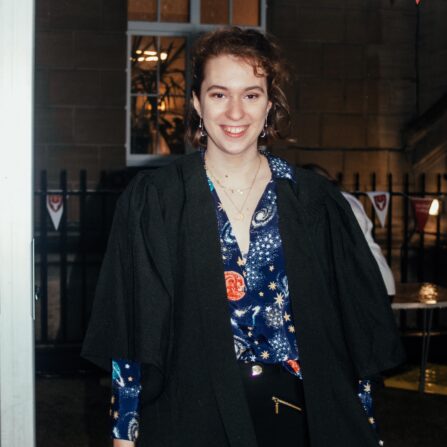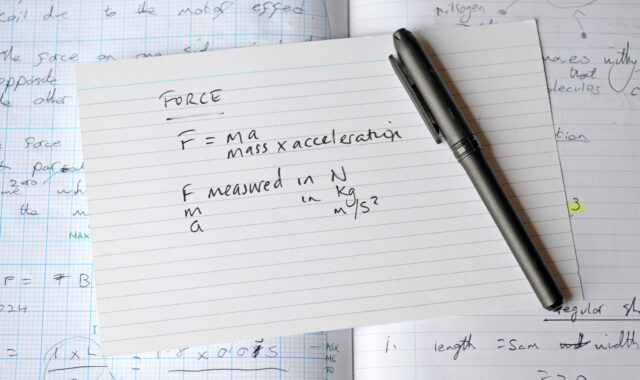
Hannah R.
MPhys – integrated Master’s in Physics.Which university are you studying at?
University of Oxford.
What subjects and qualifications did you take at school or college (e.g. A Levels, IB, BTECs, EPQ)?
I took A-levels in Maths, Further Maths, Physics, and English Literature, and also completed an EPQ.
Why did you decide to pursue this degree at university?
Right up until my school’s internal deadline for Oxbridge applications, I was torn between studying Physics or English Literature. I love using maths to solve real-life problems and learning about the crazy inner workings of the universe, but I also love analysing fiction and studying the different schools of literary criticism. I was really stuck. The thing that changed everything for me was the reaction I got when I admitted my fear that I wasn’t good enough for physics. I knew I could fit in with other lit students, but physics was this big, imposing degree for geniuses. I didn’t see myself belonging there. But when my physics teacher told me that, yes, I could do a physics degree, and do it well, everything kind of fell into place. It was the confidence boost I needed. I decided that I could always keep up my love for literature and writing in my spare time, but if I stopped physics now, I couldn’t regain my knowledge later on.
What does an average day or week at university look like for you (e.g. lectures, practicals, independent study, other interests)?
Physics is a very full-on subject. I have lectures pretty much every weekday, typically until 1pm. This leaves my afternoons free for problem sheets (questions to complete based on the course content from the last week or so) and tutorials, where my tutorial partner(s) and I sit down with our tutor and discuss the problem sheets. Normally, I have two sheets due a week, and correspondingly two tutorials. In my 1st year, we had practicals in the labs every week, from 10am to 5pm. In my 2nd year, we had two days of labs every fortnight. We got to choose which labs we did. Having a course with lots of contact hours does make it easier to organise your schedule. I aim to complete all my work during the day, leaving my evenings free for socialising and resting. My friends and I cook dinner together most days.
What aspect of your course do you most enjoy?
The problem solving. The physics you do at university is far more mathematical than at school. I always loved maths at school, but not the pure stuff – the proofs, the numbers, etc etc. Physics allows me to work through extended problems and actually have something to show for it at the end. There’s nothing more satisfying than completing several pages of maths and getting an answer that you can actually picture. Of course, there’s nothing more painful than completing several pages of maths and realising you missed a minus sign two pages back. Taking this course, I’ve discovered how much of the real world can be described with equations. In A-level, there were typically two sides to physics: the quantitative, where you had random equations you could plug numbers into, and the qualitative, where you had to describe a phenomenon in words. Now, these two camps are combined. Things are much more convincing and exciting when you get to derive the result yourself.
What do you find most challenging about your degree?
The difficulty level has really ramped up over my 2 years at Oxford. Things aren’t as clear cut nowadays: there are different ways to get to the same answer, and more and more we are asked to estimate or use our intuition. Lots of people at university go through the experience of going from high achievers to people who can’t answer every question on a problem sheet. This is totally normal, but that doesn’t make it less hard! It can be a serious knock to your confidence – it certainly was for me. The thing to remember is everyone is in the same boat and, most importantly, you aren’t expected to get everything right the first time. That’s what your lecturers and tutors are for!
What are your aspirations after your degree?
I’m not really one for future aspirations. I tend to take things one step at a time: get my GCSEs, get my A-levels, get my degree…then blank. Even now, I’m not entirely sure what I want to do after university. Going to such a prestigious uni and taking quite a respected course doesn’t mean I’m short of suggestions! But I want to do what feels right for me. Currently, I’d love to work in editing and publishing. Maybe fiction, maybe scientific papers, who knows? Not me, that’s for sure.
What would be your top piece of advice for anyone wanting to study physics?
Firstly, trust your instincts. Don’t let the imposter syndrome get you down! Wherever you study, whatever you study, you’ve chosen that subject for a reason, and your university has chosen you for a reason. They’re experts in finding the best students for the course, so bow to their expertise and trust that you’re in the right place. Secondly, read a lot! Wider reading is great for your personal statement. It’s also great for broadening your curriculum. There is much more to science, and to science history, than rich white men who always look grumpy in black-and-white photos. When you go to university, it can be easy to forget that. Every once in a while, take a step back, diversify the science you learn, and remind yourself that you can read for pleasure as well as for your studies!




Comments